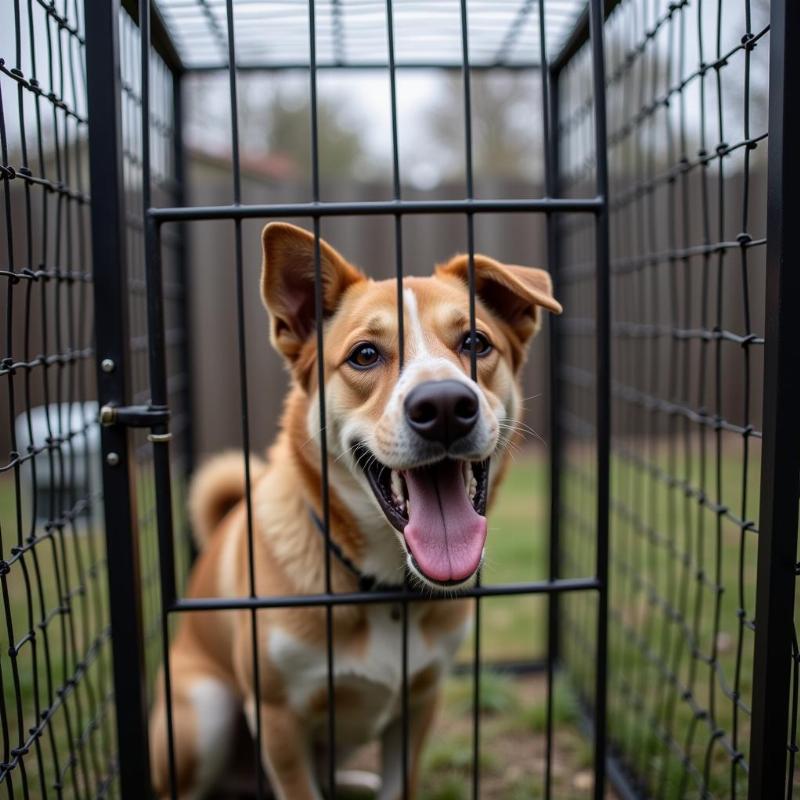Your dog’s incessant barking in their kennel can be frustrating, disrupting your peace and potentially bothering your neighbors. But before you get exasperated, remember that barking is a natural canine communication method. Understanding why your dog keeps barking in their kennel is the first step to addressing the behavior. This article will guide you through common causes of kennel barking and offer effective solutions tailored to the American dog owner.
Why is My Dog Barking So Much in Their Kennel?
Several factors can trigger excessive barking in kennels. Is your dog bored? Anxious? Do they need to potty? Or perhaps they’ve learned that barking gets them attention. Let’s explore these possibilities. Loneliness and boredom are frequent culprits. A dog left alone in a kennel for extended periods can become restless and bark out of frustration. Similarly, anxiety, especially separation anxiety, can manifest as excessive barking. Your dog might also be barking due to a physical need, like needing to go outside. Lastly, if your dog has learned that barking elicits a reaction from you, even a negative one, they may continue the behavior.
 Dog Barking In Kennel Due to Loneliness
Dog Barking In Kennel Due to Loneliness
Addressing Boredom and Anxiety
Providing mental and physical stimulation can significantly reduce boredom-related barking. Puzzle toys filled with treats can keep your dog occupied and engaged. Rotate toys regularly to maintain novelty. Consider providing a safe chew toy, ensuring it’s appropriate for your dog’s size and chewing habits. For anxiety, create a comfortable and secure den-like environment within the kennel. A familiar blanket or toy can offer comfort. Practice crate training gradually, starting with short durations and gradually increasing the time spent inside. Consult a certified professional dog trainer or veterinary behaviorist for severe cases of separation anxiety. They can offer personalized strategies for your dog’s specific needs.
Meeting Your Dog’s Physical Needs
Ensure your dog’s basic needs are met. A tired dog is less likely to bark excessively. Provide regular exercise appropriate for your dog’s breed and age, whether it’s a brisk walk, a play session at the dog park, or a romp in the backyard. Ensure they have access to fresh water at all times, especially during warmer months. Establish a consistent potty break schedule, including before and after kennel time.
Breaking the Barking Habit
If your dog has learned that barking gets them attention, even negative attention, it’s crucial to break this cycle. Avoid yelling or scolding, as this can reinforce the barking behavior. Instead, ignore the barking and only reward quiet behavior. When your dog is quiet, even for a short period, offer praise and a small treat. Consistency is key to success.
Seeking Professional Help
If your dog’s barking persists despite your efforts, consult a veterinarian or a certified dog trainer. They can rule out any underlying medical conditions and provide tailored behavior modification techniques. Remember, addressing barking effectively requires patience, understanding, and consistent training.
Conclusion
A barking dog in a kennel can be a challenge, but it’s a solvable one. By understanding the underlying cause of the barking and implementing the appropriate strategies, you can create a more peaceful environment for both you and your furry friend. Remember, patience, consistency, and a focus on your dog’s well-being are crucial for success. Addressing your dog’s physical and emotional needs is the first step towards a quieter, happier home.
FAQ
- How can I tell if my dog’s barking is due to anxiety? Other signs of anxiety may include pacing, panting, whining, destructive behavior, and excessive licking.
- Is it cruel to crate train my dog? No, when done correctly, crate training can provide a safe and secure den for your dog.
- What type of puzzle toys are best for kennel enrichment? Choose toys that are durable, safe, and appropriate for your dog’s size and chewing habits. Food-dispensing puzzles are a great option.
- How long can I leave my dog in their kennel? This depends on your dog’s age, breed, and individual needs. Consult your veterinarian for guidance.
- What if my dog continues to bark despite training? Seek professional help from a certified dog trainer or veterinary behaviorist.
- Are there any specific kennel features that can reduce barking? A comfortable, appropriately sized kennel placed in a quiet location can help.
- Can medications help with kennel barking? In some cases, medication may be necessary for anxiety-related barking, but this should be discussed with your veterinarian.
Related Articles
Beautdogs.us is your premier online resource for all things dog-related in the United States. We offer expert advice on dog breeds, care, training, and products. Whether you’re a seasoned dog owner or just starting your journey with a furry companion, Beautdogs.us provides comprehensive and trustworthy information to help you navigate the joys and challenges of dog ownership. Contact us for personalized guidance at [email protected] or +1 501-555-7529. Visit Beautdogs.us today!